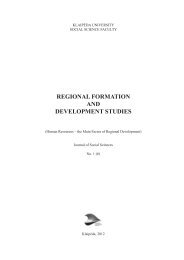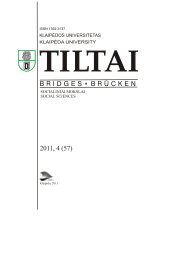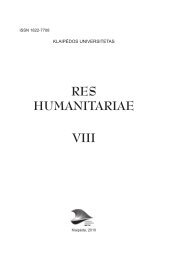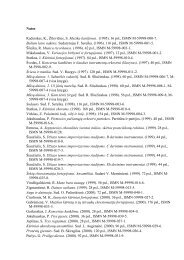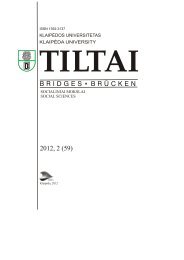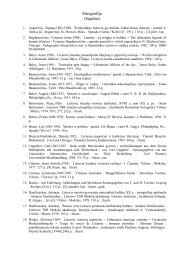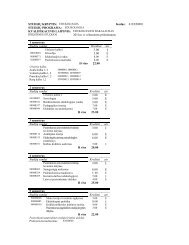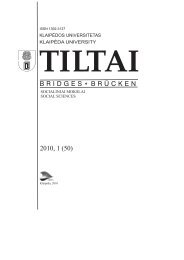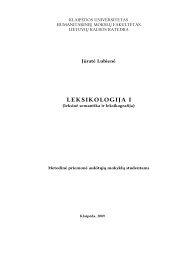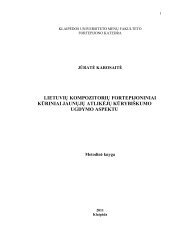BALTICA10
BALTICA10
BALTICA10
You also want an ePaper? Increase the reach of your titles
YUMPU automatically turns print PDFs into web optimized ePapers that Google loves.
L’abbé Jean Lebeuf, (1687-<br />
1760), a Forgotten Precursor<br />
of Archaeoastronomy<br />
and Ethnoastronomy<br />
ARNOLD<br />
LEBEUF<br />
122<br />
Celestial phenomena: comets<br />
In the course of denouncing superstitions, Jean Lebeuf<br />
quotes some very precious historical fragments from<br />
ancient times. Thus, in the 9 th century, “When the Emperor<br />
[Louis le Debonnaire, son of Charles the Great,<br />
in 837] saw this comet [in Aix la Chapelle during the<br />
Easter celebration], being cautious of this sort of sign,<br />
he stopped suddenly, and before going to bed, he had<br />
a certain man of his court called, together with myself,<br />
whom he considered to be very instructed in the knowledge<br />
of astronomy, and he asked our advice. I begged<br />
him to give me time to observe this comet in order to<br />
study the truth, and I would give him a very precise<br />
report in the morning. The Emperor believed (rightly)<br />
that I was tricking him, both to gain time and to delay<br />
the moment of telling him some bad news. ‘Go’, he<br />
said, ‘to the next room and then tell us what you think<br />
of it. I am sure I did not see this star yesterday evening,<br />
and you yourself did not notice anything. For me, I see<br />
clearly that it is one of those comets about which we<br />
have been speaking these last few days. Tell me what<br />
you think it is foretelling.’ I gave him some sentences<br />
on the subject and then stopped. ‘There is something’,<br />
he said, ‘you want to keep secret’. This was because it<br />
is told that this sort of phenomenon announces a political<br />
change and the death of the prince. I quoted the<br />
passage of the prophet where it is said: ‘Do not fear the<br />
signs in the sky as do other nations’. Immediately, and<br />
without any preparation, as if by the effect of his own<br />
virtue, he said: ‘We should only fear Him who created<br />
both us and that star; we can never admire Him enough<br />
nor praise His clemency as he sends these signs only<br />
to wake us up from the sleep in which we are, we impenitent<br />
sinners. The marvel tells me in particular and<br />
the others in general: let us hurry to improve ourselves<br />
and do better than in the past, in fear that the Lord, after<br />
having offered us penitence, would find us unworthy<br />
of His mercy.’ After these words, he took a few swigs<br />
of wine, and ordered all to do the same. We were told<br />
later that he had spent all the night in prayers” (1726b,<br />
p.2429-2430).<br />
Celestial phenomena:<br />
aurora borealis<br />
“I shall not conceal from you, Sir, that my aim was<br />
to tell you a few words about something still existing<br />
which the people call the Septentrional light because it<br />
moves in the direction of the North. Here, these lights<br />
only display themselves in the middle of the air at<br />
about the time of Advent…. I will tell you in general<br />
that this light has nothing to do with astronomy…”<br />
(1726b, p.2431-2432).<br />
The Abbé was wrong about this, as we now know. But<br />
he quotes early medieval references to the observation<br />
of these lights, which will certainly be of interest for<br />
our modern historians.<br />
“It is very difficult to believe that Mr Maraldi wrote<br />
that a thousand years had passed without the mention<br />
of this phenomenon; that is from the years 584, 585,<br />
586 and 587 until 1154 and beyond. Indeed, if we take<br />
the trouble of consulting the authors of ancient chronicles…<br />
Hughes of Flavigny is certainly worthy of attention<br />
since this author, a very clever one for that epoch,<br />
was living when this light appeared, and he saw it, tried<br />
to understand it, and made some prognostics for the<br />
future. He refers to a similar light which had appeared<br />
a short time before the bloody battle fought in our part<br />
of the world, commonly called the battle of Fontenay,<br />
on Saturday June 25 th in the year 841” (1724, p.2349).<br />
This letter gives other dates and medieval references to<br />
the observation of the northern lights. It is followed by<br />
two other letters by Monsieur Meynier (1726b, p.2436-<br />
2443) and by Monsieur Capperon about the northern<br />
lights seen over La Ville d’Eu on October 19 th , 1726<br />
(1726b, p.2443-2449). Astrophysicists studying solar<br />
activity would doubtless like to study these sources<br />
further.<br />
A folklorist<br />
The most interesting of the Abbé’s discussions are certainly<br />
those on old calendars, popular credulity and lunar<br />
cycles. In the Mercure de France of January 1734<br />
we find an interesting letter about the popular traditions<br />
concerning the occurrence of the feast of Easter<br />
when it falls on the 25 th of April its latest possible date:<br />
“Sir, you are probably informed of the traditions running<br />
among the people concerning the occurrence of<br />
the feast of Easter on the 25 th of April, such as will be<br />
the case in the next year, 1734. The result of this occurrence<br />
is that the celebration of Corpus Christi then<br />
takes place on June 24th, the day of the Nativity of St<br />
John the Baptist; and it is because of this conjunction<br />
that a certain proverb came into existence concerning<br />
the End of the World. In order to demonstrate this illusion,<br />
it seems to me enough to recall its origin or rather<br />
its late appearance. Everyone knows that the solemnity<br />
of Corpus Christi was only established as late as in the<br />
XIIIth century...” (1734a).<br />
Another popular tradition discussed by the Abbé, is<br />
that concerning a miraculous grave that fills with water<br />
at full moon. Here again, he prefers not to mount<br />
a full-frontal attack on the faith of simple people, but<br />
instead proposes and lets his readers consider a rational<br />
reason for the miracle: “I have often felt like talking to<br />
you about a type of Phenomenon that might somehow



